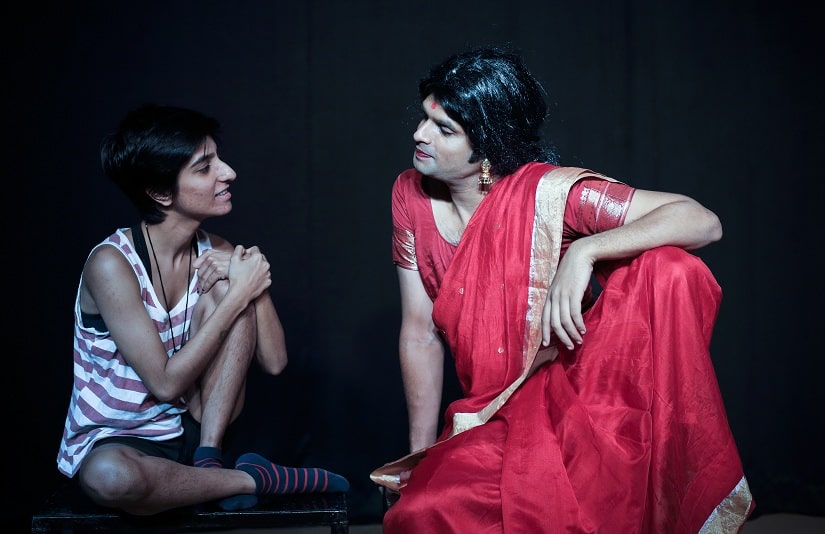It’s funny that the burden to ‘come out of the closet’ lies solely on queer individuals. What happens when they finally ‘come out’? Do we invite them into our homes, thereby coming out of our own closets? InQueerAble Happenings, founded by Vikram Phukan and Shobhna S Kumar, seeks to address such questions by curating and creating queer content in the arts. Their latest presentation, Short+Salty, is a collection of six professionally performed bilingual short plays. Staged in celebration of the first anniversary of the Supreme Court’s landmark judgment on Section 377, the production explores identities, conventions, and same-sex love in rigid societal structures. After having performed to a packed audience on a rainy Mumbai Saturday, the showrunners Apeksha Vora and Prajesh Kashyap, as well as the founders, speak to Firstpost about the collective, queer expression, theatre, and the power it holds. Edited excerpts below: How was InQueerAble Happenings conceived? Shobhna: Well, I wanted to celebrate one year since the 377 verdict, and a chance meeting with Vikram at the Kashish Film Festival led to this idea of an evening of short theatre. We did one event earlier in August at Five Senses Theatre Studio, and this was where we wanted to mount Short+Salty, which is one of the many ideas that we want to work with at InQueerAble Happenings. What is InQueerAble Happenings doing differently than other platforms for queer expression? Vikram: I don’t think ours is an exclusive platform as such; there are other groups that work very actively towards creating queer content. Maybe we are different in that those initiatives are community-led, and ours brings in professional theatre practitioners to create a community experience. The outlook of the platform thus changes. Our vision is to portray queer experiences through a range of works that look at queer lives outside the lens of identity politics, and take the discourse ahead. [caption id="" align=“alignnone” width=“825”]  A still from Short+Salty. Photograph by Nazia Khan.[/caption] How does one navigate the theatre space in India post the Section 377 ruling? Shobhna: In his address at the Kala Ghoda Arts Festival this year, Justice DY Chandrachud said “Legal change must be followed by a change in our societal and moral values. Our work must begin now so that we may not be the cause of injustice from having once being the inheritors of injustice.” Nurturing creativity, promoting the queer word and providing a safe space for dialogue, which we strive to do with our curations, is the best way to change attitudes about Indian LGBTQIA+ communities. How important is theatre as a medium to the stories that constitute Short+Salty? Apeksha: Short stories give us a glimpse into lives of people and tease our imagination to build a world around them. Vikram had watched a Drama School Mumbai annual student showcase, Aadyant, which was a stringing-together of six short 15-minute pieces made by students. My piece (created with Prajesh and Dusha), Two Soldiers, was about queer explorations within the Indian Military Academy. Vikram found both the piece and the format of the evening an interesting way to bring together a world of stories, and slowly realised that many young theatre makers in the city have made or would be interested in making short pieces around queer themes. As a format, the production is meant to nudge the audiences’ imagination to a world where these stories are possible. Prajesh: Queer has never been mainstream. I think times have changed, and so has the urge to tell these stories. InQueerAble, in my opinion, has managed to bring out most shades from the queer palette — the stories, as we’ve gathered, have even resonated with people who do not identify as queer, because at the end of the day they are about love, loss, confusion, identity and relationships — ideas that have a universal appeal. There can be nothing more beautiful than the experience of watching a performance with a bunch of people in a room — it’s like we create something together. That for me is theatre and therefore a really powerful way of affecting people and sharing these stories.
Why did you think these six stories needed to be told and heard? Vikram: As Apeksha mentioned above, Two Soldiers sparked off the idea and therefore became the first piece I selected. From the start, I wanted this to be a platform where new works can be commissioned, and we have two new pieces in this first selection: Graduation Day, directed by Lakshvir Singh Saran, about two women who raise a well-adjusted son, and Pehli Shaadi, a piece in verse written and performed by Trinetra Tiwari, about a poetically-inclined hijra who weaves dreams with her words, that might one day be borne out in reality. The other pieces were again works that I had watched, and knew would fit into the format of the evening. There are more works in the pipeline, and many more already existing queer pieces that we are looking to showcase. What does the future look like for InQueerAble Happenings? Vikram: We had a heartening response to the very first show of Short+Salty. It’s a baby step, and hopefully we can create something that is a regular feature on the cultural calendar. Shobhna: It’s time we opened up our societal closets and invited people in. This is the only way people will get to know us, and lead to change that we want. InQueerAble Happenings will be presenting Short+Salty on 18 September in Mumbai again.


)
)
)
)
)
)
)
)
)



